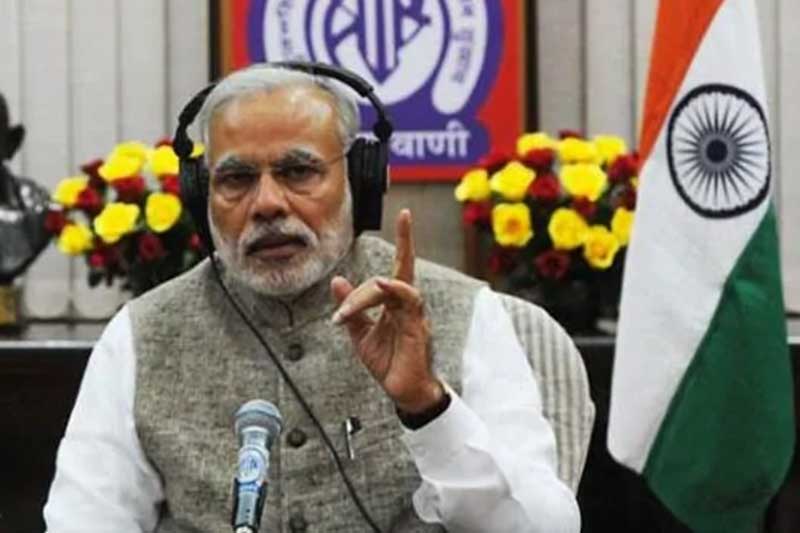


The new book "MODIALOGUE" by Ashwin Fernandes, Executive Director at QS World University Rankings, celebrates the transformative communication strategy of PM Modi's Mann Ki Baat. The book includes contributions from notable figures, a nationwide survey, and artwork by celebrated Indian artists, highlighting the positive impact of the programme on national dialogue. Fernandes, an acclaimed academician, brings his expertise in global higher education to provide a fresh perspective on national engagement. The book also draws parallels between PM Modi's communication mastery and Chanakya's philosophies of leadership and dialogue.
Background:
Prime Minister Narendra Modi's 'Mann Ki Baat' ("Conversation from the Heart") is a monthly radio address that has become a defining feature of his communication strategy. Launched in 2014, the program aims to connect Modi directly with the citizens of India, bypassing traditional media intermediaries.
The New Book: 'MODIALOGUE'
Ashwin Fernandes, Executive Director at QS World University Rankings, has authored a book titled 'MODIALOGUE,' which delves into the transformative impact of 'Mann Ki Baat' on national dialogue. The book offers a comprehensive analysis of the program, including contributions from notable figures, a nationwide survey, and artwork by celebrated Indian artists.
Key Findings:
Fernandes's research reveals that 'Mann Ki Baat' has significantly enhanced Modi's connection with the masses. The program has:
Parallels to Chanakya's Philosophies:
Fernandes draws parallels between Modi's communication mastery and the teachings of ancient Indian strategist Chanakya. Chanakya emphasized the importance of:
Top 5 FAQs and Answers
1. How often does 'Mann Ki Baat' air? Answer: Once a month, on the last Sunday of each month.
2. What topics does Modi cover in his addresses? Answer: A wide range of topics, including government initiatives, social issues, national unity, and citizen concerns.
3. How can I listen to 'Mann Ki Baat'? Answer: The program is broadcasted on All India Radio stations, Doordarshan channels, and the PMO's website.
4. Has 'Mann Ki Baat' faced any criticism? Answer: Yes, some critics have accused Modi of using the program for political propaganda. However, supporters argue that it is an important platform for direct communication between the Prime Minister and the public.
5. What is the future of 'Mann Ki Baat'? Answer: Fernandes believes that the program is likely to continue as a key communication tool for Modi. It allows him to maintain a personal connection with the electorate and influence public opinion.

As IndiGo faces operational difficulties due to a surge in winter demand, heavy leave season, and crew shortages, the Indian government has intervened to minimize passenger inconvenience and ensure smooth operations for the country's largest carrier. The Civil Aviation Minister chaired a review meeting, which resulted in temporary approvals by the DGCA to address crew scheduling, training, and simulator availability. These measures, such as allowing Flight Operations Inspectors to temporarily return to flying duties and extending the validity of refresher checks for Designated Examiners, aim to stabilize IndiGo's operations and prevent extended disruptions during a critical time for airports operating at full capacity.

Warner Bros. Discovery CEO David Zaslav announced that Netflix has agreed to acquire Warner Bros. studio and HBO Max for $72 billion. The sale does not include WBD's television networks, which will be spun out as originally planned. Zaslav assured employees that the two companies will remain separate until the deal is finalized and an "Integration Office" will be set up to manage the transition with Netflix. The board believes that this structure provides the strongest foundation for both businesses in a rapidly evolving marketplace.

The European Commission has handed down a whopping $140 million fine to X, formerly known as Twitter, for violating the EU's Digital Services Act (DSA). The fine comes as a result of an investigation launched in December 2023, just over a year after Elon Musk bought the social media platform and implemented changes that allowed anyone to obtain the coveted verified blue checkmark in exchange for a fee. The Commission found this change to be deceptive and in violation of the DSA's transparency obligations. This marks a major setback for X and an important message to companies operating within the EU that compliance with regulations is not optional.

Civil Aviation Minister Ram Mohan Naidu has placed the blame on IndiGo for the widespread disorder and disruption in its operations, citing the airline's mismanagement of crew under new FDTL regulations. The Ministry has granted IndiGo a temporary exemption from FDTL norms in order to restore normalcy. Naidu also revealed that a committee has been formed to investigate the extent of the failure and hold those responsible accountable. However, the government's top priority remains mitigating the situation and supporting affected passengers while ensuring safety standards are not compromised.

In a major move, Netflix has announced its plans to acquire Warner Bros., HBO, HBO Max, and other related studios from Warner Bros. Discovery. With this deal valued at a whopping $82.7 billion, Netflix aims to expand its content library, increase theatrical film releases, and strengthen its global presence. The merger is expected to bring in annual savings of $2 billion to $3 billion and is set to benefit shareholders, subscribers, and the entire entertainment industry. However, it remains to be seen how this will affect consumers of Netflix and HBO Max, both of which are popular streaming services in the U.S.

In a historic move, Netflix has announced plans to purchase Warner Bros. Discovery in a deal worth $82.7 billion, including debt. The acquisition would make Netflix even bigger in the streaming market, with more than 300 million subscribers. This move also signals the growing influence of tech companies in the entertainment industry, as Netflix becomes the first major legacy studio to fall to a Silicon Valley competitor. The deal would also allow Netflix to continue its theatrical releases, something it had previously avoided. This unexpected move has sent shock waves through Hollywood and the broader media landscape.

In the midst of chaos and disruptions in flights, IndiGo CEO Pieter Elbers has been named as India's Best CEO by Fortune India. Despite the challenges, Elbers has successfully navigated IndiGo through an uncertain environment and has taken several measures to address the issue, including increased customer communication and addressing their needs. With the support of the civil aviation ministry and DGCA, Elbers hopes to return to a "full normal situation" by December 10-15, providing relief to affected passengers.

IndiGo, India's largest private sector airline, is facing major disruptions as daily cancellations reach up to 200 flights. The airline's operations have been severely hit, with over 1,000 cancellations in the span of 36 hours. The chaos has left passengers stranded and angry, with several major airports experiencing cancellations and delays. Questions are now being raised about IndiGo's dominance and potential monopoly in the country's aviation sector.

Air India, owned by Tata Group, came under scrutiny after operating an A320 neo plane without a valid Airworthiness Review Certificate (ARC) for many flights in November. The Directorate General of Civil Aviation (DGCA) and the airline have launched investigations, with concerned employees being de-rostered until further notice. The airline has acknowledged the seriousness of the issue and is working to identify and eradicate any deficiencies in their system.

The Directorate General of Civil Aviation (DGCA) has announced a relaxation in Flight Duty Time Limit (FDTL) norms in order to ease the operational disruptions faced by airlines like IndiGo. The change now allows pilots' leave to be counted as rest, overturning the previous rule of no substitution for weekly rest. This decision comes amid IndiGo's continuous cancellations, sparking concerns over passenger safety and political concerns. However, the Airline Pilots Association (ALPA) has raised objections to the selective relaxations given to IndiGo, stating it compromises safety. Despite these challenges, DGCA has urged for collective support from pilots to ensure safe and reliable air travel for passengers.